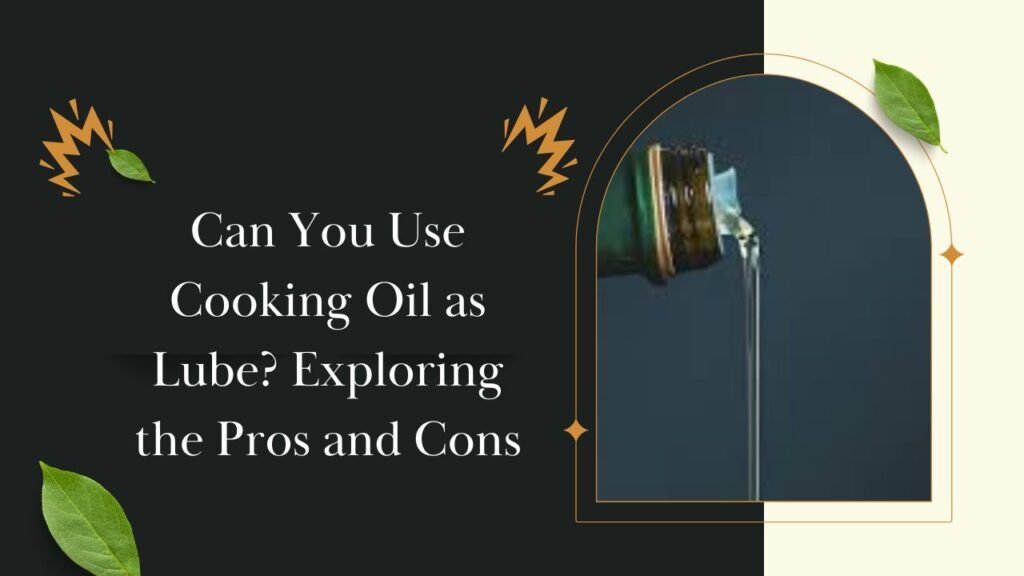Ever found yourself in a pinch and wondered, Can you use cooking oil as lube? It’s a question that pops up more often than you might think, especially when traditional lubricants are out of reach. While cooking oils are readily available in most kitchens, using them as a lubricant isn’t as straightforward as it seems. Let’s dive deep into this topic, exploring the benefits, risks, and alternatives to help you make an informed decision.
Understanding the Basics
Lubricants play a crucial role in enhancing comfort and reducing friction during intimate activities. They come in various forms, including water-based, silicone-based, and oil-based. Can you use cooking oil as lube taps into the oil-based category, but is it a safe and effective substitute?

What is Lubricant?
Lubricant, often referred to as lube, is a substance used to reduce friction between body parts or between a body part and a surface. It enhances comfort and can make intimate activities more enjoyable.
Types of Lubricants
- Water-Based Lubricants: Versatile and safe to use with condoms and sex toys. Easy to clean but may require reapplication.
- Silicone-Based Lubricants: Long-lasting and waterproof. Not always compatible with silicone sex toys.
- Oil-Based Lubricants: Long-lasting and moisturizing but can degrade latex condoms and increase the risk of infections.
Can You Use Cooking Oil as Lube?
The short answer is yes, but with significant caveats. Can you use cooking oil as lube depends on several factors, including the type of oil, your body’s sensitivity, and the intended use.
Common Cooking Oils Considered for Lubrication
| Cooking Oil | Pros | Cons |
|---|---|---|
| Coconut Oil | Natural antimicrobial properties, moisturizing | Can solidify at lower temperatures, may cause irritation for some |
| Olive Oil | Readily available, moisturizing | Strong scent, can stain fabrics, may cause irritation |
| Vegetable Oil | It is not a true cooking oil, can still degrade condoms | Can degrade latex condoms, risk of infections |
| Baby Oil | Smooth texture, designed for skin | Not a true cooking oil, can still degrade condoms |
Pros of Using Cooking Oil as Lube
- Accessibility: Most households have some form of cooking oil on hand.
- Cost-Effective: Generally cheaper than specialized lubricants.
- Natural Options: Oils like coconut and olive are natural and free from synthetic additives.
Cons of Using Cooking Oil as Lube
- Condom Compatibility: Oil-based lubricants can degrade latex condoms, increasing the risk of breakage and sexually transmitted infections (STIs).
- Risk of Infections: Oils can disrupt the natural balance of vaginal flora, leading to bacterial or yeast infections.
- Skin Irritation: Some individuals may experience irritation or allergic reactions to certain oils.
- Staining and Mess: Cooking oils can stain sheets and are harder to clean up compared to water-based lubricants.
- Not Formulated for Intimate Use: Cooking oils lack the specific formulations that make personal lubricants safe and effective for sexual activities.
Factors to Consider Before Using Cooking Oil as Lube
Before deciding to use cooking oil as a lubricant, it’s essential to weigh the pros and cons carefully. Here are some factors to consider:
1. Purpose and Use
- Solo Play vs. Partnered Activities: For solo use, such as masturbation, cooking oils might seem convenient. However, when involving a partner and especially if using condoms, the risks increase significantly.
- Use with Sex Toys: Oil-based lubricants can damage silicone-based sex toys, leading to costly replacements.

2. Allergies and Sensitivities
- Patch Test: Always perform a patch test on a small area of skin to check for any adverse reactions.
- Fragrance-Free Options: Opt for oils without added fragrances to minimize irritation risks.
3. Health Considerations
- Vaginal Health: Using non-sanitized oils can introduce bacteria into the vaginal area, disrupting the natural pH balance.
- Existing Infections: If you have an existing infection, using cooking oil could exacerbate the condition.
Table: Comparison of Cooking Oils and Commercial Lubricants
| Feature | Cooking Oils | Commercial Lubricants |
|---|---|---|
| Safety for Condoms | Not safe for latex condoms | Formulated to be condom-compatible |
| Risk of Infections | Higher risk due to potential bacteria | Lower risk with hygienic formulations |
| Texture and Feel | Can be greasy and sticky | Smooth and consistent texture |
| Ease of Cleanup | Stains and hard to wash off | Easily washable with water |
| Cost | Generally cheaper | Varies, but often more expensive |
| Variety | Limited to types of cooking oils | Wide range including flavored, warming, etc. |
Personal Experiences: Weighing the Choices
I remember a friend who swore by coconut oil as her go-to lubricant. She loved its natural feel and pleasant scent. However, after a few uses, she noticed an increase in yeast infections, which made her reconsider. This personal anecdote highlights the importance of understanding how different oils interact with your body.
Rhetorical Question
Have you ever wondered if a simple kitchen staple can serve a more intimate purpose? It’s easy to reach for what’s familiar, but intimacy often requires products specifically designed for safety and comfort.
Alternative Natural Lubricants
If you’re leaning towards natural options but concerned about the drawbacks of cooking oils, here are some alternatives:
1. Aloe Vera Gel
- Pros: Natural, soothing, and generally safe for sensitive skin.
- Cons: Ensure it’s pure and free from additives or alcohol.
2. Plant-Based Lubricants
- Pros: Made from natural ingredients, often free from harmful chemicals.
- Cons: Can be pricier and less readily available than cooking oils.
3. Egg Whites
- Pros: Natural and free from oils.
- Cons: High risk of bacterial contamination, not recommended for intimate use.
4. Shea Butter
- Pros: Moisturizing and long-lasting.
- Cons: Can be thick and may require warming before use.
Table: Natural Lubricant Alternatives
| Alternative | Pros | Cons |
|---|---|---|
| Aloe Vera Gel | Soothing, natural, easy to find | Must be pure to avoid irritation |
| Plant-Based | Free from harmful chemicals, eco-friendly | More expensive, limited availability |
| Egg Whites | Natural, free from oils | Risk of bacterial infection, not recommended |
| Shea Butter | Moisturizing, long-lasting | Thick texture, may require warming |
Expert Opinions
Health professionals generally advise against using cooking oils as lubricants due to the associated risks. According to a gynecologist, Dr. Emily Rogers states, “While cooking oils can provide temporary lubrication, they are not formulated for intimate use and can lead to infections and other complications.”
Rhetorical Question
Is convenience worth the potential health risks? It’s a balance between ease and safety that each individual must navigate.
Tips for Safe Lubricant Use
If you decide to use cooking oil despite the risks, here are some tips to minimize potential issues:
- Choose High-Quality, Organic Oils: This reduces the risk of introducing harmful bacteria.
- Conduct a Patch Test: Apply a small amount to your skin to check for reactions.
- Avoid Internal Use: Limit use to external areas to reduce infection risks.
- Clean Thoroughly: Wash all areas and any tools or toys used to prevent bacterial growth.
The Environmental and Ethical Angle
Choosing the right lubricant isn’t just about personal safety—it also touches on environmental and ethical considerations.
Sustainable Options
Opt for lubricants that are environmentally friendly, free from harmful chemicals, and produced ethically. This not only benefits your health but also supports sustainable practices.
Ethical Sourcing
Ensure that the products you choose are sourced responsibly, supporting fair trade and environmentally conscious farming practices.
FAQs: Addressing Common Concerns
1. Can using cooking oil as lube cause infections?
Yes, using cooking oils can disrupt the natural balance of bacteria in the vaginal area, increasing the risk of bacterial or yeast infections.
2. Are there any safe oil-based lubricants?
Yes, there are lubricants specifically formulated to be safe for intimate use. These products undergo testing to ensure they do not cause irritation or infections.
3. Can cooking oil damage sex toys?
Absolutely. Oil-based lubricants can degrade silicone-based sex toys, leading to cracks and reduced lifespan.
4. Is there a natural alternative to cooking oil for lubrication?
Yes, options like pure aloe vera gel and plant-based lubricants offer natural alternatives without the associated risks of cooking oils.
5. How can I minimize irritation if I choose to use cooking oil?
- Perform a patch test before use.
- Choose high-quality, organic oils.
- Limit use to external areas only.
- Ensure thorough cleaning after use.
Final Thoughts
Can you use cooking oil as lube is a question that deserves careful consideration. While the convenience and availability of cooking oils make them tempting alternatives, the potential risks—ranging from infections to condom degradation—often outweigh the benefits. If you’re seeking a natural lubricant, there are safer, more effective options available that cater specifically to intimate needs.
Personal preferences and experiences vary, and what works for one person may not work for another. It’s essential to prioritize your health and comfort by choosing products designed for their intended use. Always consult with a healthcare professional if you have concerns or experience adverse reactions.
Rhetorical Question
Isn’t your well-being worth investing in a product that’s specifically designed to keep you safe and comfortable? Making informed choices ensures that your intimate moments remain enjoyable and free from unwanted complications.
Frequently Asked Questions (FAQs)
1. Can cooking oil be used as a lubricant during pregnancy?
While there are no specific studies on the use of cooking oils during pregnancy, it’s generally recommended to use products specifically designed for intimate use to avoid potential infections or irritations that could affect both mother and baby.
2. What should I do if I experience irritation after using cooking oil as lube?
Stop using the oil immediately and rinse the affected area with warm water. If irritation persists, consult a healthcare professional for appropriate treatment.
3. Are there any specific cooking oils that are safer than others for use as lube?
Coconut oil is often considered the safest among cooking oils due to its natural antimicrobial properties. However, it still poses risks such as potential allergic reactions and condom incompatibility.
4. How do oil-based lubricants compare to water-based ones in terms of longevity?
Oil-based lubricants generally last longer and require less frequent reapplication compared to water-based lubricants, which may dry out more quickly.
5. Can I mix cooking oil with other substances to make it safer?
Mixing cooking oil with other substances doesn’t necessarily make it safer and can introduce additional risks. It’s best to use lubricants that are formulated for intimate use.


